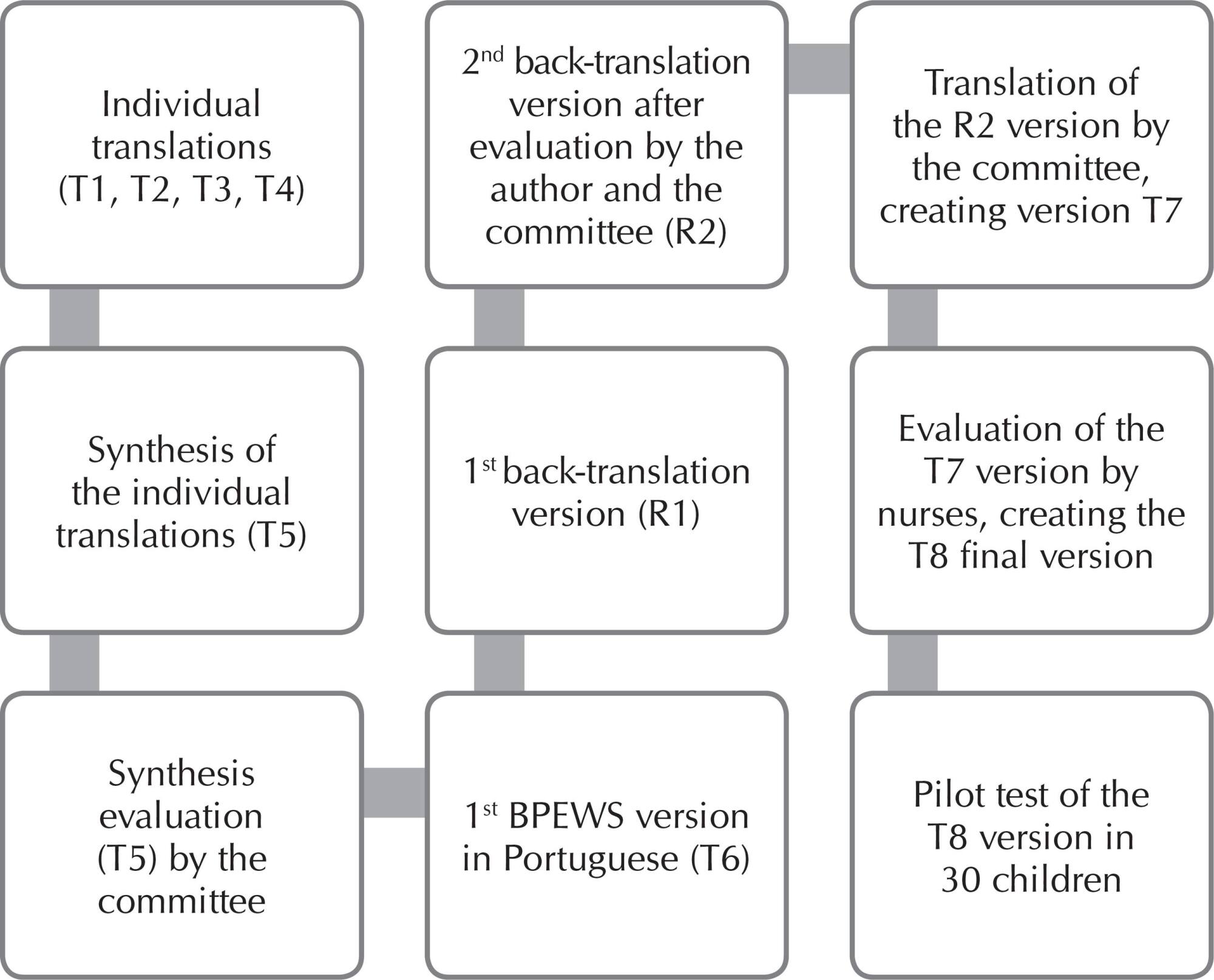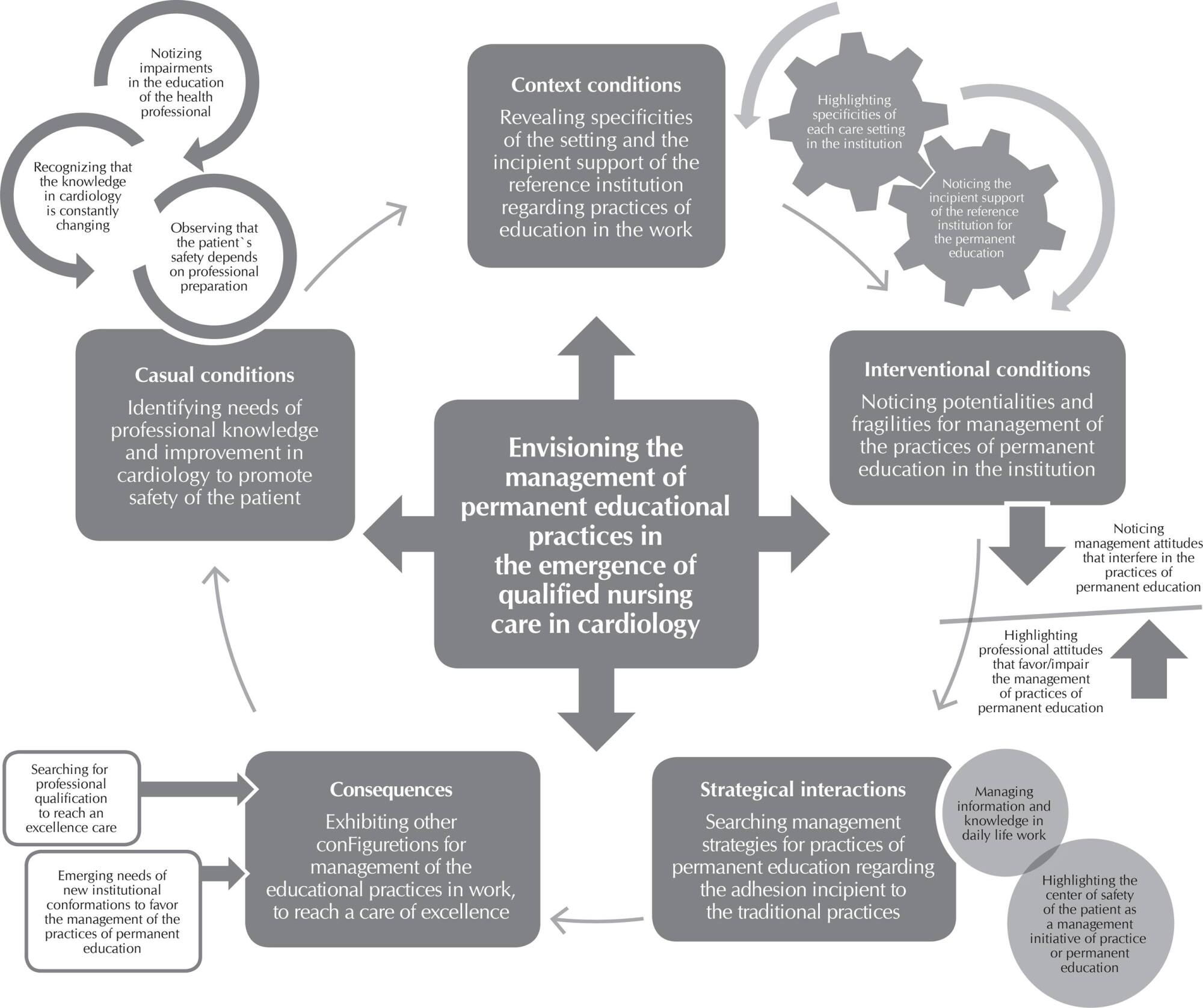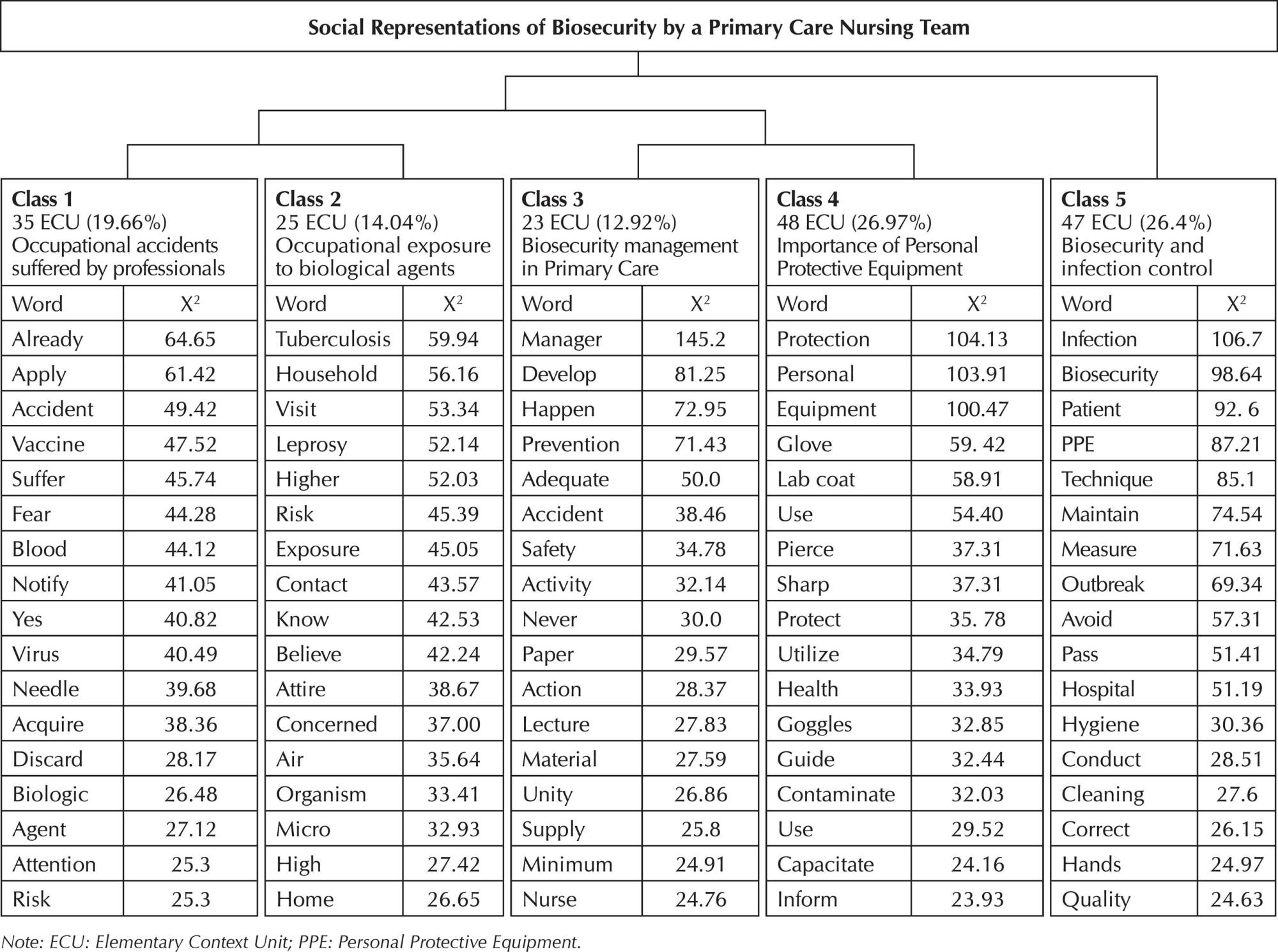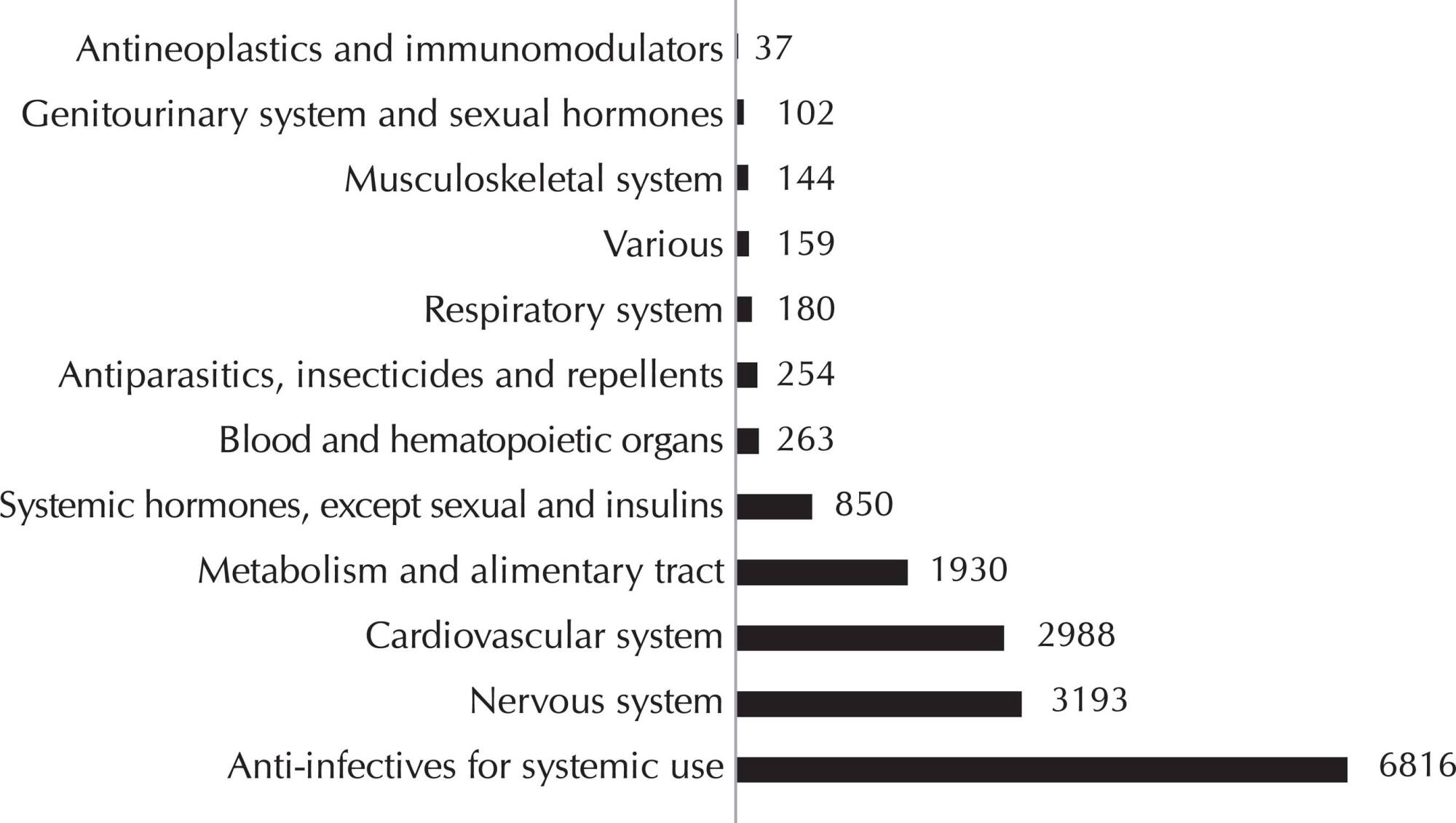-
01-01-2016
Modified early warning score: evaluation of trauma patients
Revista Brasileira de Enfermagem. 2016;69(5):906-911
Abstract
Modified early warning score: evaluation of trauma patients
Revista Brasileira de Enfermagem. 2016;69(5):906-911
DOI 10.1590/0034-7167-2015-0145
Views0See moreABSTRACT
Objective:
to identify the severity of patients admitted to an emergency trauma.
Method:
A cross-sectional and retrospective study with 115 trauma patients classified as orange (Manchester System), from June 2013 to July 2014. The data were presented as mean and standard deviation, in addition to the Pearson Chi-square test, One-Way ANOVA and Tukey tests.
Results:
from the sample, 81.7% were male with mean age of 39.46±19.71 years. Higher incidence of major trauma (48.7%) and traumatic brain injury (37.4%). At the end of the outcome and MEWS, most cases that had score 1 to 3 were referred to the operating room and the ICU.
Conclusion:
the start point of MEWS was 2 to 3 points, with significant increase in the severity of the situation of patients seen after 6 hours, and approximately half of the individuals underwent surgery, indicating that the scale is a good predictor of severity.
-
01-01-2016
Occupational health nurses: interdisciplinary experience in occupational health
Revista Brasileira de Enfermagem. 2016;69(5):897-905
Abstract
Occupational health nurses: interdisciplinary experience in occupational health
Revista Brasileira de Enfermagem. 2016;69(5):897-905
DOI 10.1590/0034-7167-2015-0113
Views0See moreABSTRACT
Objective:
to analyze the relationship of occupational health nurses with the other members of the Specialized Service in Safety Engineering and Occupational Medicine (SESMT) and characterize joint actions of these professionals in occupational health.
Method:
qualitative, exploratory, and descriptive study with 34 professionals of seven companies from the South Macroregion of the state of Rio Grande do Sul. Interviews and observations were conducted for content analysis of Bardin.
Results:
the SESMTs are multidisciplinary and intersectoral workers. Nurses have working relations of an interpersonal, technical/legal, and management of logistics/organizational nature, influenced by the technical division of work and by the division in the work environment of the staff, which distances areas, generates conflicts, and fragments the actions of the service.
Conclusion:
SESMT faces challenges to develop a work befitting their legal objectives, once staff and companies need to understand the importance of interdisciplinarity for the success of actions on the workers’ health and safety.
-
01-01-2016
Translation and adaptation of a pediatric early warning score
Revista Brasileira de Enfermagem. 2016;69(5):888-896
Abstract
Translation and adaptation of a pediatric early warning score
Revista Brasileira de Enfermagem. 2016;69(5):888-896
DOI 10.1590/0034-7167-2015-0096
Views0See moreABSTRACT
Objective:
to translate and adapt the BPEWS for the Portuguese language, with the purpose of verifying its applicability in the Brazilian context studied.
Method:
methodological study guided by international and nationally accepted recommendations for translation and adaptation of health measurement instruments. Stages of conceptual, item, semantic, operational and pre-test equivalence are described for obtaining the BPEWS Portuguese version to be used in Brazil.
Results:
the BPEWS version translated and adapted for Brazilian Portuguese (BPEWS-Br) identified, in the pilot study, that 26.6% of children were presenting warning signs for clinical deterioration.
Conclusion:
the BPEWS-Br seems to be applicable for the context studied, and its use might help nurses in the recognition and documentation of warning signs for clinical deterioration in hospitalized Brazilian children.

-
01-01-2016
Validation of the Nursing Activities Score in Portuguese intensive care units
Revista Brasileira de Enfermagem. 2016;69(5):881-887
Abstract
Validation of the Nursing Activities Score in Portuguese intensive care units
Revista Brasileira de Enfermagem. 2016;69(5):881-887
DOI 10.1590/0034-7167-2016-0147
Views0See moreABSTRACT
Objective:
to describe the process of adaptation and validation of the Nursing Activities Score to the Portuguese context.
Method:
this was a pilot study of adaptation and validation of the Nursing Activities Score with a sample consisting of 67 patients hospitalized in the intensive care units of three Portuguese hospitals. The construct validity was assessed through factor analysis procedures and the internal consistency of the items was measured through the Cronbach’s alpha coefficient.
Results:
a mean workload value of 63.04% (SD = 14.25; Median = 61.30) was obtained. Psychometric data revealed a Cronbach’s alpha of 0.71 in the total scale, indicating an acceptable accuracy. Confirmatory factor analysis suggested an appropriate adjustment between the model and the data (χ2(199) = 214.5, p = 0.214; CFI = 0.95; RMSA = 0.035).
Conclusion:
in the present study, the Portuguese version of the Nursing Activities Score was found to be a valid instrument, enabling a safe assessment of the workload of nurses.
-
01-01-2016
Managing educational practices for qualified nursing care in cardiology
Revista Brasileira de Enfermagem. 2016;69(5):872-880
Abstract
Managing educational practices for qualified nursing care in cardiology
Revista Brasileira de Enfermagem. 2016;69(5):872-880
DOI 10.1590/0034-7167-2015-0032
Views0See moreABSTRACT
Objective:
to understand significances attributed by nurses who manage nursing care to the individual affected by cardiovascular disease to relations, interactions and associations of the educational practices in a cardiovascular reference hospital. To elaborate a theoretical explanatory model based on significances attributed in the light of the complex thinking.
Method:
qualitative study, which used Theory Based on Data (TBD) as methodological reference. Twenty-two professionals of nursing participated in the study.
Results:
the results indicate need of professional qualification to ensure the safety of patients, institutional support for the realization of educational practices, attitude of openness and availability of dialogue of the health professionals and other institutional conformations for the workers’ development.
Conclusion:
the study presents a new space for the nurse’s action that can be used to qualify and optimize the nursing practice, as it provides visibility to management and care in health institutions.

-
01-01-2016
Social representations of biosecurity in nursing: occupational health and preventive care
Revista Brasileira de Enfermagem. 2016;69(5):864-871
Abstract
Social representations of biosecurity in nursing: occupational health and preventive care
Revista Brasileira de Enfermagem. 2016;69(5):864-871
DOI 10.1590/0034-7167-2015-0114
Views0See moreABSTRACT
Objective:
to understand the biosecurity social representations by primary care nursing professionals and analyze how they articulate with quality of care.
Methods:
exploratory and qualitative research based on social representation theory. The study participants were 36 nursing workers from primary health care in a state capital in the Northeast region of Brazil. The data were analyzed by descending hierarchical classification.
Results:
five classes were obtained: occupational accidents suffered by professionals; occupational exposure to biological agents; biosecurity management in primary health care; the importance of personal protective equipment; and infection control and biosecurity.
Conclusion:
the different positions taken by the professionals seem to be based on a field of social representations related to the concept of biosecurity, namely exposure to accidents and risks to which they are exposed. However, occupational accidents are reported as inherent to the practice.

-
01-01-2016
Clinical validation of nursing diagnosis “Willingness for improved infant development”
Revista Brasileira de Enfermagem. 2016;69(5):855-863
Abstract
Clinical validation of nursing diagnosis “Willingness for improved infant development”
Revista Brasileira de Enfermagem. 2016;69(5):855-863
DOI 10.1590/0034-7167-2015-0131
Views0See moreABSTRACT
Objective:
to conduct the clinical validation of nursing diagnosis “Willingness for improved infant development”.
Method:
a cross-sectional study, conducted in a Centro de Saúde da Família (Family Health Care center), with 45 healthy breastfed infants. The instrument for collecting the data was prepared based on the literature and validated by nurses. It contained the following variables: sociodemographic, gestational, and obstetrical variables; breastfed infant’s nutritional profile; evaluation of the defining characteristics of the proposed nursing diagnosis.
Results:
all the defining characteristics were found to have high sensitivity values (>90%), positive predictive values (>65%), negative predictive values (>66%); however, low specificity values (<32%). In this study, the defining characteristics we found to have estimates (>0.50) within the ROC curve, which provides good sensitivity and specificity.
Conclusion:
this study verified the structural elements of the proposed nursing diagnosis to be relevant in the clinical context, which justifies the need for its being employed with children, taking into account its contribution to improving nursing care.
-
01-01-2016
Oral drugs at a hospital unit: adequacy for use via enteral feeding tubes
Revista Brasileira de Enfermagem. 2016;69(5):847-854
Abstract
Oral drugs at a hospital unit: adequacy for use via enteral feeding tubes
Revista Brasileira de Enfermagem. 2016;69(5):847-854
DOI 10.1590/0034-7167-2015-0081
Views0See moreABSTRACT
Objective:
to describe the profile of standardized oral drugs at a hospital unit and assess their adequacy for use via enteral feeding tubes, according to recommendations from the literature.
Method:
descriptive study, with data on drugs collected from the Pharmacy Service Dispensing System. Specific recommendations for the use of these drugs via enteral feeding tubes were found after searches in literary databases, books, manuals, guidelines and package insert collections.
Results:
among the 236 dispensed oral drugs, 86% were in solid form; of those, 32 were “non-crushable”, with the liquid form available at the institution. Twenty-eight drugs with potential interactions with enteral nutrition were identified. Sixty percent of those presented specific recommendations on their administration via enteral feeding tube.
Conclusion:
the joint participation of multidisciplinary nutritional therapy and care teams and the implementation of programs for continuous training are suggested strategies for the prevention of potential problems in the administration of drugs in the hospital setting.

-
01-01-2015
Research lines in nursing: phylosophical and epistemological highlights
Revista Brasileira de Enfermagem. 2015;68(4):723-729
Abstract
Research lines in nursing: phylosophical and epistemological highlights
Revista Brasileira de Enfermagem. 2015;68(4):723-729
DOI 10.1590/0034-7167.2015680421p
Views0See moreRESUMEN
Objetivo:
elucidar destaques filosóficos y epistemológicos mediante consideraciones en favor de la casualidad de cuestiones en el interés de la Enfermería.
Método:
es fundamentado en las proposiciones teóricas de Johannes Hessen y de otros autores consagrados.
Resultados:
clareamiento de aspectos sustantivo e implicaciones adjetivas no sólo el interés de la investigación, resaltando los significados esenciales del asunto coincidido con las elaboraciones de disertaciones y tesis (Maestría y Doctorado de Enfermería).
Conclusión:
texto representa una contribución valiosa para esclarecer mejor detalles de la construcción del conocimiento en la temática y problemática del asunto puesto en causa.
-
01-01-2015
Linhas de pesquisa em enfermagem: destaques filosóficos e epistemológicos
Revista Brasileira de Enfermagem. 2015;68(4):723-729
Abstract
Linhas de pesquisa em enfermagem: destaques filosóficos e epistemológicos
Revista Brasileira de Enfermagem. 2015;68(4):723-729
DOI 10.1590/0034-7167.2015680421p
Views0See moreRESUMO
Objetivo:
elucidar destaques filosóficos e epistemológicos mediante considerações significativas, essenciais, em favor da causalidade de questões no interesse da Enfermagem.
Método:
abordagem fundamentada nas proposições teóricas de Johannes Hessen, com referência a outros autores expertos no tema.
Resultados:
esclarecimento de aspectos substantivos e implicações adjetivas não só no interesse da investigação, ressaltando os significados essenciais do assunto, condizente com as elaborações de dissertações de mestrado e teses de doutorado de Enfermagem.
Conclusão:
trata-se de uma contribuição valiosa para esclarecer melhor detalhes da construção do conhecimento na temática e problemática do assunto posto em causa, as linhas de pesquisa em enfermagem.

-
01-01-2015
Using the theory of meaningful learning in nursing education
Revista Brasileira de Enfermagem. 2015;68(4):713-722
Abstract
Using the theory of meaningful learning in nursing education
Revista Brasileira de Enfermagem. 2015;68(4):713-722
DOI 10.1590/0034-7167.2015680420i
Views0See moreABSTRACT
Objective:
to synthesize the scientific literature about the Theory of Meaningful Learning in the process of teaching and learning in nursing.
Method:
this is an integrative review conducted in the databases MEDLINE, LILACS, SciELO, BDENF and CINAHL with studies addressing the subject or aspects of the theory of meaningful learning of David Ausubel. Ten studies were included, from which six were written in Portuguese and four in English, published from 1998 to 2013.
Results:
five studies used the theory of meaningful learning, four studies cited Ausubel as the author of this theory and only two studies followed the framework for the application of the theory completely. There are only a few studies on this subject and those which explore it are not correlated with Ausubel’s theory.
Conclusion:
it is necessary to break with the dichotomy between theory and practice and promote the articulation of content with action, introducing the student as the author of their own knowledge.

-
01-01-2015
Nursing scientific production on health promotion, chronic condition, and aging
Revista Brasileira de Enfermagem. 2015;68(4):705-712
Abstract
Nursing scientific production on health promotion, chronic condition, and aging
Revista Brasileira de Enfermagem. 2015;68(4):705-712
DOI 10.1590/0034-7167.2015680419i
Views1See moreABSTRACT
Objective:
to characterize the scientific production of Postgraduate Programs Nursing in Brazil on health promotion with a focus on elderly people with chronic conditions in the period from 2006 to 2010.
Method:
integrative research developed by searching for dissertations and theses in the database of the Center for Nursing Studies and Research of the Brazilian Nursing Association published in the period from 2006 to 2010 and which focused on health promotion for elderly people with chronic conditions.
Results:
five themes emerged: “Living with the disease”; “Technologies of care”, “Potential for self-care” “Psycho-spiritual dimension”, and “Family caregiver”.
Conclusion:
it was possible to identify nursing care as a key element to promote the health of elderly people and make them more independent in their care so as to live with their limitations or disabilities, even when affected by chronic diseases.

-
01-01-2015
Longevity according to life histories of the oldest-old
Revista Brasileira de Enfermagem. 2015;68(4):697-704
Abstract
Longevity according to life histories of the oldest-old
Revista Brasileira de Enfermagem. 2015;68(4):697-704
DOI 10.1590/0034-7167.2015680418i
Views0See moreABSTRACT
Objective:
to interpret life histories of the oldest-old in a community, grounded on the perspective of the Active Aging and Life Course.
Method:
this is a qualitative research. Participants included twenty seniors 80 years and older, users of a Basic Health Unit. Life histories were collected and analyzed according to the proposition of the Autobiographical Narrative Interview.
Results:
during the analytic process, elements found in the elders’ present and past arose, contributing to the development of a theoretical model: “Building longevity along the life course.”
Conclusion:
longevity is rooted in the past, strongly infl uenced by the family culture and life course; assumptions of the Active Aging are more meaningful in the informants’ present trajectory. The content of the narratives pointed to new possibilities of Gerontology Nursing intervention in Primary Care, aiming at health promotion and intervention, specially grounded on the respect to the oldest-elders’ culture.

-
01-01-2015
Accuracy in inference of nursing diagnoses in heart failure patients
Revista Brasileira de Enfermagem. 2015;68(4):690-696
Abstract
Accuracy in inference of nursing diagnoses in heart failure patients
Revista Brasileira de Enfermagem. 2015;68(4):690-696
DOI 10.1590/0034-7167.2015680417i
Views0See moreABSTRACT
Objective:
to determine the accuracy of nursing diagnoses of fatigue, intolerance to activity and decreased cardiac output in hospitalized HF patients.
Method:
descriptive study applied to nurses with experience in NANDA-I and/or HF nursing diagnoses. Evaluation and accuracy were determined by calculating effi cacy (E), false negative (FN), false positive (FP) and trend (T) measures. Nurses who showed acceptable inspection for two diagnoses were selected.
Results:
the nursing diagnosis of fatigue was the most commonly mistaken diagnosis identifi ed by the nursing evaluators.
Discussion:
the search for improving diagnostic accuracy reaffi rms the need for continuous and specifi c training to improve the diagnosis capability of nurses.
Conclusion:
the training allowed the exercise of clinical judgment and better accuracy of nurses.
-
01-01-2015
Direct cost of development and documentation of the nursing process
Revista Brasileira de Enfermagem. 2015;68(4):683-689
Abstract
Direct cost of development and documentation of the nursing process
Revista Brasileira de Enfermagem. 2015;68(4):683-689
DOI 10.1590/0034-7167.2015680416i
Views0See moreABSTRACT
Objective:
identify the average direct cost (ADC) of the activities performed by nursing professionals in the nursing process development and documentation at the medical clinic of a teaching hospital.
Method:
1040 activities were observed and the ADC was calculated by multiplying the time spent by professionals by the unit cost of direct labor.
Results:
the ADC of patient admission was R$ 55.57 (SD=19.44); among the activities of patient follow-up, the assessment phase documentation had the most significant ADC (R$ 17.70 – SD=14.60); the ADC of descriptive records corresponded to R$ 1.21 (SD=1.21) and the ADC of the nursing team for shift change was R$ 54.23 (SD=28.95).
Conclusion:
the study promotes visibility of the work performed by nursing professionals in the development of the nursing process, providing financial data to ensure consistent arguments for proper resources to its feasibility.
-
01-01-2015
Health status and mental health in patients after percutaneous coronary intervention
Revista Brasileira de Enfermagem. 2015;68(4):676-682
Abstract
Health status and mental health in patients after percutaneous coronary intervention
Revista Brasileira de Enfermagem. 2015;68(4):676-682
DOI 10.1590/0034-7167.2015680415i
Views0See moreABSTRACT
Objective:
to assess the association between perceived health status and the mental health of patients submitted to percutaneous coronary intervention after hospital discharge.
Method:
a quantitative and cross-sectional study involving 101 participants. The following instruments were used: a sociodemographic and clinical characterization instrument, the Medical Outcomes Study 36-Item Short-Form Health Survey (SF-36), and the Hospital Anxiety and Depression Scale (HADS). Participants were divided into three groups: no anxiety and no depression (G1); anxiety or depression (G2); and both (G3). The ANOVA test was used for the intergroup comparison of means on the SF-36 domains.
Results:
There was an association between perceived health status and mental health. The participants in G1 presented higher scores in all SF-36 domains in comparison with participants in G2 and G3.
Conclusion:
Participants with no anxiety and depression presented better-perceived health status in comparison with those with anxiety or depression, or both.
-
12-04-2023
A cronicidade e o seu impacto na saúde do trabalhador: uma chamada para ações concretas
Revista Brasileira de Enfermagem. 2023;76:e76suppl301
Abstract
A cronicidade e o seu impacto na saúde do trabalhador: uma chamada para ações concretas
Revista Brasileira de Enfermagem. 2023;76:e76suppl301
DOI 10.1590/0034-7167.202376suppl301pt
Views0A relação entre cronicidade e trabalho tem sido uma preocupação crescente na sociedade contemporânea. À medida que o número de doenças crônicas aumenta em todo o mundo, é fundamental compreender como essas condições impactam a saúde dos trabalhadores(). Neste editorial, exploraremos os impactos da cronicidade na saúde do trabalhador, destacando dados da Carga Global de […]See more -
12-04-2023
Chronicity and its impact on workers’ health: a call for concrete actions
Revista Brasileira de Enfermagem. 2023;76:e76suppl301
Abstract
Chronicity and its impact on workers’ health: a call for concrete actions
Revista Brasileira de Enfermagem. 2023;76:e76suppl301
DOI 10.1590/0034-7167.202376suppl301
Views0The relationship between chronicity and work has been a growing concern in contemporary society. As the number of chronic illnesses increases around the world, it is critical to understand how these conditions impact workers’ health(). In this editorial, we will explore the impacts of chronicity on workers’ health, highlighting data from the Global Burden of […]See more -
12-04-2023
General Law on Personal Data Protection and applicability to Nursing
Revista Brasileira de Enfermagem. 2023;76:e20230126
Abstract
General Law on Personal Data Protection and applicability to Nursing
Revista Brasileira de Enfermagem. 2023;76:e20230126
DOI 10.1590/0034-7167-2023-0126
Views0See moreABSTRACT
Objectives:
to reflect on the impacts of the General Personal Data Protection Law on Nursing practice.
Methods:
reflection article, through the intentional collection of materials relating to the topic.
Results:
legislation regulates confidentiality, processing and data sharing, requiring institutional protection measures. The nursing team is responsible for acting preventively, both in care and in the management role, in order to avoid the misuse of the patient’s personal data. The law allows academic research to be carried out as long as the purpose is clear, data collection occurs with an explicit purpose and data is anonymized.
Final Considerations:
although the General Personal Data Protection Law requires greater care in relation to data processing, it is established on precepts of good faith and respect for the rights of the individual, concepts aligned with the nursing code of ethics.

-
REVIEW12-04-2023
Supervision of professional nursing practice in Brazil: a scoping review
Revista Brasileira de Enfermagem. 2023;76:e20230077
Abstract
REVIEWSupervision of professional nursing practice in Brazil: a scoping review
Revista Brasileira de Enfermagem. 2023;76:e20230077
DOI 10.1590/0034-7167-2023-0077
Views0See moreABSTRACT
Objectives:
to map studies that analyze the audit process of nursing councils.
Methods:
this is a scoping review, anchored in the JBI framework, with the guiding question: what is the evidence of the audit process of legal practice of nursing by class councils (COFEN/COREN system)? The searches were carried out in October and November 2022 without limitation of language and year.
Results:
of the 9 selected studies, all are Brazilian and published from 2014 onwards. Among the topics addressed are the role, challenges, costs and difficulties in nurse auditors’ daily work process, in addition to the contribution of the audit sector in Brazil.
Conclusions:
the studies gathered discuss aspects related to costs, challenges and difficulties, but there is no focus on corrective, disciplinary and educational activities as well as little is said about the audit process, its reporting, referral and outcomes.

-
ORIGINAL ARTICLE12-04-2023
Overview of nursing ethics teaching in Brazilian public higher education institutions
Revista Brasileira de Enfermagem. 2023;76:e20220808
Abstract
ORIGINAL ARTICLEOverview of nursing ethics teaching in Brazilian public higher education institutions
Revista Brasileira de Enfermagem. 2023;76:e20220808
DOI 10.1590/0034-7167-2022-0808
Views0See moreABSTRACT
Objectives:
to outline the teaching of ethics in undergraduate Nursing programs in Brazilian public higher education institutions.
Methods:
descriptive and exploratory study, carried out through the documentary analysis of pedagogical projects of undergraduate Nursing programs in Brazil.
Results:
153 active undergraduate Nursing programs were found, of which 106 provide the pedagogical project. In addition to deontological teaching, the teaching of ethics was identified in a transversal way associated with themes such as Social Context, Hospital and Community Care, Pharmacology, Systematization of Nursing Care, Surgical Nursing, Epidemiology, Palliative Care, Management in Nursing, Diversity, Women’s, Children’s, Adolescent’s, Adult’s and Older People’s Health, and Mental Health.
Final Considerations:
the challenge in teaching nursing ethics is its integration with each action of caring, teaching and managing.

-
12-04-2023
La ética de la atención de enfermería a las personas transgénero
Revista Brasileira de Enfermagem. 2023;76:e20220797
Abstract
La ética de la atención de enfermería a las personas transgénero
Revista Brasileira de Enfermagem. 2023;76:e20220797
DOI 10.1590/0034-7167-2022-0797es
Views0See moreRESUMEN
Objetivos:
debatir sobre aspectos éticos en la atención de enfermería a personas transgénero.
Métodos:
estudio reflexivo fundamentado sobre los dilemas que se plantean en los cuidados de enfermería a personas transgénero. El relato se ha estructurado en torno a los cuatro principios bioéticos.
Resultados:
la atención sanitaria a las personas trans es compleja, transversal a muchos dispositivos y especialidades y longitudinal en el tiempo por lo que precisa de la actuación coordinada. Existe un marco ético en el que se encuadran los cuidados de enfermería que se precisan en la atención a este colectivo.
Consideraciones Finales:
la enfermera como agente de salud puede asumir diversas líneas generales en la atención a pacientes transgénero. Para ello, se debe brindar formación adicional no solo a los profesionales, también a los estudiantes de enfermería y de las demás ciencias de la salud.
-
12-04-2023
Ethical dilemmas at the end of life: a reflection from the Philosophical Perspective of Luigina Mortari
Revista Brasileira de Enfermagem. 2023;76:e20220759
Abstract
Ethical dilemmas at the end of life: a reflection from the Philosophical Perspective of Luigina Mortari
Revista Brasileira de Enfermagem. 2023;76:e20220759
DOI 10.1590/0034-7167-2022-0759
Views0See moreABSTRACT
Objectives:
to reflect on the ethical dilemmas involved in the care of patients at the end of their lives.
Methods:
this is a theoretical-reflective study based on the ethics of care proposed by Luigina Mortari.
Results:
discussing care involves addressing the ways of being inherent to human existence and understanding the unique characteristics of this condition. Ethical care constitutes an action driven by interest in the other and by the perception of their need. Ethical dilemmas are a part of end-of-life care, making it essential to maintain respectful assistance that considers the patient’s autonomy, using strategies for expressing their wishes, and ensuring continuous clear and empathetic communication among all those involved in providing care.
Final Considerations:
issues related to being, stemming from one’s reality of dependency and vulnerability, contribute to the emergence of ethical dilemmas present in care actions.
Search
Search in:
Nuvem de Tags
Adolescente (85) Atenção Primária à Saúde (239) COVID-19 (91) Criança (91) Cuidados de Enfermagem (269) Educação em Enfermagem (151) Educação em Saúde (139) Enfermagem (930) Enfermagem Pediátrica (86) Estudantes de Enfermagem (77) Estudos de Validação (131) Família (87) Idoso (208) Promoção da Saúde (99) Qualidade de Vida (104) Saúde do Trabalhador (86) Saúde Mental (145) Saúde Pública (82) Segurança do Paciente (150) Tecnologia Educacional (100)



